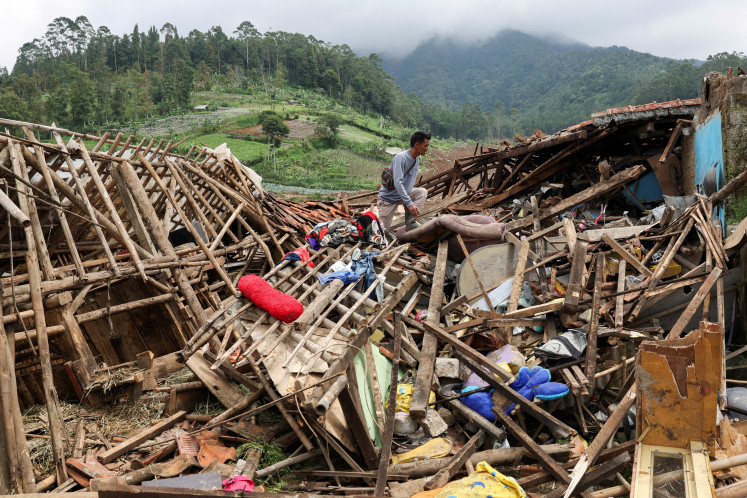Popular Reads
Top Results
Can't find what you're looking for?
View all search resultsPopular Reads
Top Results
Can't find what you're looking for?
View all search resultsDrought threatens RI food security target
The governmentâs efforts to improve food security are facing a tough road ahead after several regions across the archipelago have reported massive harvest failure over the past few months caused by the long dry season
Change text size
Gift Premium Articles
to Anyone
T
he government's efforts to improve food security are facing a tough road ahead after several regions across the archipelago have reported massive harvest failure over the past few months caused by the long dry season.
In Central Java, one of the country's largest rice-producing regions, 6,578 hectares of paddy fields in several regencies, including Grobogan, Blora and Pati, have experienced crop failure this year due to severe drought, according to the Central Java Agriculture Agency's food crop cultivation head Nuswantoro SP.
Nuswantoro said that almost 27,000 ha of paddy fields in the province, along with 294 ha of corn fields and 237 ha of soybean fields, were on the verge of crop failure as well, as they were yet to be sufficiently irrigated.
'Out of the 35 regencies and municipalities in Central Java, 29 of them have been struggling with the impact of the drought,' he said on Wednesday.
Meanwhile the local Disaster Mitigation Agency (BPBD) in Jambi declared emergency standby status for drought in the province on Monday after eight out of the province's 11 regions experienced severe drought in the midst of a long dry season.
The province's Agriculture Agency also reported that 68 ha of paddy fields have experienced crop failure.
'One hectare of paddy field can produce an average of 5 tons of rice. This means that we have lost a potential of 340 tons of rice during this year's harvest season,' agency head Amrin Aziz said.
Indonesia imported at least 425,000 tons of rice from Thailand and Vietnam last year.
President Joko 'Jokowi' Widodo has previously pledged to lead the country to become self-sufficient in rice production within three years.
However, the National Disaster Mitigation Agency (BNPB) revealed on Tuesday that 25,000 ha of crop fields across the archipelago have experienced harvest failure due to the El Niño weather phenomenon, which affects temperatures and rainfall patterns. It also revealed that 77 regencies and municipalities in 12 provinces, including West Java, Central Java, South Sulawesi, East Nusa Tenggara and Papua, have also been struggling with a water crisis due to the long absence of rain.
The Indonesian Meteorology, Climatology and Geophysics Agency (BMKG) has predicted that the El Niño effect will extend Indonesia's dry season, which normally occurs between April and September, until November.
In Boyolali, Central Java, the local BPBD has reported that thousands of residents over 42 sub-districts in the regency have been struggling with a water crisis.
Residents in Kalimati sub-district, Juwangi district, for example, must dig up soil near a dried-up river in search of water. They have to wait around an hour until murky and smelly water emerges from the holes.
'The water can be directly used for showers or washing clothes. But we must allow the water to settle for at least one day before boiling it [for drinking water],' said 37-year-old Suyekti, a local resident.
Meanwhile in Southeast Minahasa regency, North Sulawesi, residents of the regency capital of Ratahan reported that water supply from the regional administration-run tap water company (PDAM) has been disrupted for the past several days.
PDAM official Steven Kawenas said the disruptions have been triggered by both technical problems and the decreasing amount of raw water supply in the city.
'We only have one raw water source [for the city]. Water reserves have been decreasing, while the demand for tap water is increasing,' he said.
- Ganug Nugroho Adi in Boyolali and Lita Aruperes in Manado contributed to the article.










